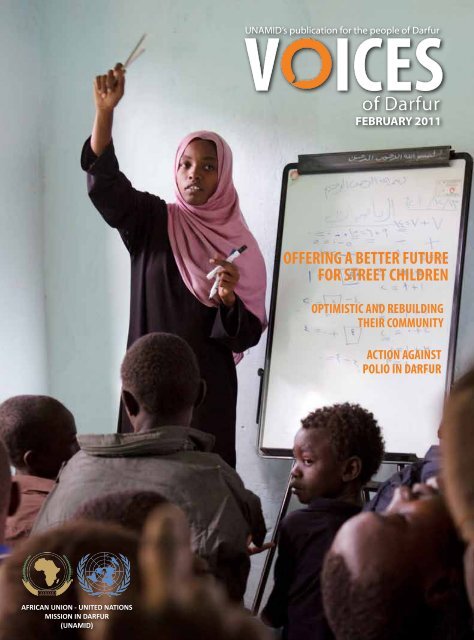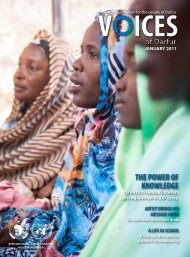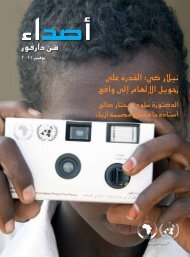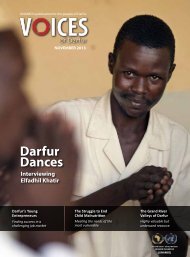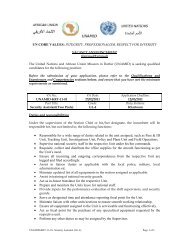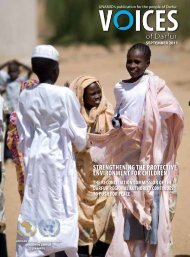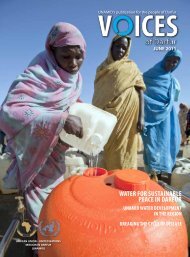OFFERING A BETTER FUTURE FOR STREET CHILDREN
English - Unamid
English - Unamid
- No tags were found...
Create successful ePaper yourself
Turn your PDF publications into a flip-book with our unique Google optimized e-Paper software.
UNAMID’s publication for the people of Darfur<br />
FEBRUARY 2011<br />
<strong>OFFERING</strong> A <strong>BETTER</strong> <strong>FUTURE</strong><br />
<strong>FOR</strong> <strong>STREET</strong> <strong>CHILDREN</strong><br />
OPTIMISTIC AND REBUILDING<br />
THEIR COMMUNITY<br />
ACTION AGAINST<br />
POLIO IN DARFUR<br />
AFRICAN UNION - UNITED NATIONS<br />
MISSION IN DARFUR<br />
(UNAMID)
IN THIS ISSUE February 2011 | Vol II • No.2<br />
TIMELINE<br />
03 | January at a Glance<br />
COMMUNITY<br />
04 | Optimistic and rebuilding their community<br />
06 | Refugees from Chad return home to Darfur<br />
08 | The aftermath of fighting<br />
09 | Shangil Tobaya, a town of social harmony<br />
10 | Offering a better future for street children<br />
13 | Action against polio in Darfur<br />
UNAMID<br />
14 | National staff proudly contribute to UNAMID<br />
Director of Communications and<br />
Public Information<br />
Kemal Saïki<br />
Editor-in-Chief<br />
Sharon McPherson<br />
Staff Editors/Writers<br />
Ala Mayyahi<br />
Sharon Lukunka<br />
Guiomar Pau Sole<br />
Mayada Umbadda<br />
Saeed Adam<br />
Daniel Adekera<br />
Muntasir Sharafadin<br />
Contributors<br />
Awatif Akbar<br />
Photographers<br />
Olivier Chassot<br />
Albert Gonzalez Farran<br />
Sgt. Sainey Colley<br />
Graphic Designer<br />
Arie Cahyadi Santoso<br />
Street children at school in El Fasher<br />
Front Cover Photo by Olivier Chassot<br />
Returnee children in Sullu<br />
Back Cover Photo by Albert Gonzalez Farran<br />
PUBLISHED BY :<br />
UNAMID Communications<br />
and Public Information Division (CPID)<br />
Phone: +249 92 244 7705 or 3415<br />
Email: unamid-publicinformation@un.org<br />
Website: http://unamid.unmissions.org<br />
facebook.com/UNAMID<br />
twitter.com/UN_AUinDarfur<br />
The designations employed and the presentation of the<br />
material in this publication do not imply the expression<br />
of any opinion whatsoever on the part of UNAMID concerning<br />
the legal status of any country, territory, city or<br />
area, or of its authorities, or concerning the delimitation<br />
of its frontiers or boundaries.<br />
2 VOICES OF DARFUR, FEBRUARY 2011<br />
Material contained in this publication may be freely<br />
quoted or reprinted, provided credit is attributed to<br />
UNAMID.
TIMELINE<br />
05<br />
A UNAMID international civilian<br />
staff member and Hungarian<br />
national, Istvan Papp, who was abducted<br />
from his accommodation in El Fasher on 7<br />
October, is freed after 90 days in captivity.<br />
He underwent a medical examination and<br />
was in good health. Since the beginning<br />
of the Mission in 2008, ten UNAMID<br />
peacekeepers have been abducted.<br />
07<br />
A delegation led by United States<br />
Senator and Chairman of the US<br />
Senate’s Foreign Relations Committee,<br />
John Kerry, arrives in El Fasher, North<br />
Darfur. He addresses the thousands of<br />
IDPs sheltered outside the Mission team<br />
site in Shangil Tobaya, following recent<br />
clashes in the area last December.<br />
09<br />
Voting begins in Darfur. An<br />
estimated 23,000 people are<br />
registered to vote on the referendum.<br />
UNAMID ensured the speedy<br />
transportation of polling materials and<br />
peaceful completion of the voting process.<br />
10<br />
UNAMID Joint Special<br />
Representative (JSR) Ibrahim<br />
Gambari meets local authorities and<br />
internally displaced persons (IDPs), and<br />
Mission staff in Nyala and Khor Abeche in<br />
South Darfur. He states that peacekeepers<br />
will do everything in their power to assist<br />
the IDPs.<br />
11<br />
The Chairman of the UN<br />
Secretary-General’s Panel on the<br />
Referendum and former President of the<br />
Republic of Tanzania, Mr. Benjamin Mkapa,<br />
visits Nyala in South Sudan. He expresses<br />
his satisfaction with the peaceful conduct<br />
of the referendum and hopes that the<br />
outcome will be accepted by all.<br />
JANUARY<br />
AT A GLANCE<br />
13<br />
US Special Envoy for Sudan,<br />
Scott Gration, accompanied by<br />
US Senior Advisor on Darfur, Dane Smith,<br />
concludes a two-day visit to Darfur. He<br />
was briefed by UNAMID leadership on the<br />
latest developments in the peace process,<br />
as well as on the current security situation.<br />
18<br />
Following the stoning of a Central<br />
Reserve Police convoy in El Fasher,<br />
North Darfur, officers enter a high school<br />
in search of those responsible. On entry,<br />
shots are fired. The action resulted in<br />
more rocks being thrown, leaving three<br />
students injured.<br />
UNAMID senior officials attend a signing<br />
ceremony of a peace pact between Sudan<br />
Liberation Army/Historic, a breakaway<br />
faction of Sudan Liberation Army/Abdul<br />
Wahid, and the Government of the Sudan<br />
in Bali Siref, village located at the northern<br />
edge of the Jebel Marra mountains. The<br />
Mission also provided logistical support<br />
for the event, airlifting some of the<br />
participants.<br />
21<br />
Nearly one hundred children<br />
associated with armed<br />
movements are registered in El Fasher,<br />
North Darfur, in a voluntary exercise<br />
conducted by the state’s Disarmament,<br />
Demobilization and Reintegration (DDR)<br />
Commission, UNAMID, UNICEF and the<br />
African Charitable Society for Motherhood<br />
and Child Care.<br />
23<br />
A cordon-and-search operation<br />
in Zam Zam camp conducted<br />
by a joint Sudanese military and police<br />
operation results in the arrest of thirtyseven<br />
individuals, ten 4x4 vehicles<br />
impounded, and seizure of three assault<br />
rifle magazines, unspecified quantities of<br />
ammunition, suspected stolen goods and<br />
illegal substances.<br />
24<br />
JSR Gambari visits peacekeepers<br />
in El Geneina, Forobaranga<br />
and Zalingei in West Darfur where he<br />
is briefed on the Mission’s activities in<br />
both areas. The JSR, accompanied by UN<br />
Resident Coordinator, and Humanitarian<br />
Coordinator, Georg Charpentier, meets<br />
with the Wali (Governor) of West Darfur<br />
and the state’s security committee. He<br />
also visits the Um al-Mumineen School in<br />
Forobaranga, which was rehabilitated by<br />
UNAMID peacekeepers.<br />
25<br />
UNAMID reports on the latest<br />
outbreak of violence, which began<br />
on 24 January, between the Sudanese<br />
Armed Forces and Sudan Liberation<br />
Army/Minni Minnawi movement in Tabit,<br />
located approximately 45 km south of El<br />
Fasher, which began on 24 January.<br />
29<br />
Ambassador Ki Doulaye Corentin<br />
of Burkina Faso assumes duty<br />
as UNAMID’s new acting Deputy Joint<br />
Special Representative (DJSR).<br />
VOICES OF DARFUR, FEBRUARY 2011<br />
3
COMMUNITY<br />
Optimistic and rebuilding their community<br />
Returnees from Kalma camp - a ray of hope for thousands of<br />
displaced people<br />
BY Sharon Lukunka<br />
Seven years ago, the residents of Sullu<br />
village, located approximately 60<br />
kilometers west of El Geneina in West<br />
Darfur, were forced to leave their land<br />
due to the ongoing conflict. While some<br />
settled in nearby localities in West Darfur,<br />
the majority escaped to Kalma camp, near<br />
Nyala, South Darfur. Two months ago,<br />
more than 120 of them found their way<br />
back home to the village.<br />
They were part of the first returnees in an<br />
operation initiated by the Government of<br />
the Sudan with the assistance of United<br />
Nations agencies.<br />
Immediately upon their arrival in the<br />
village, the returnees began rebuilding<br />
their homes. Families and friends were<br />
reunited, people began looking for work<br />
in nearby towns and children enrolled in<br />
school. People from neighboring villages<br />
4 VOICES OF DARFUR, FEBRUARY 2011<br />
assisted them in constructing their houses<br />
and nearby community leaders also<br />
visited them to discuss ways of peaceful<br />
co-existence.<br />
“We are very happy to return home, where<br />
our fathers grew up. We would like to feel<br />
that we are part of the community and<br />
we’re asking for more assistance from<br />
humanitarian organizations to build our<br />
homes and our capacity for economic<br />
development,” said one of the community<br />
leaders, Sheikh Abdallah Mohamed Ali.<br />
Farming is the main source of income<br />
in this community. Since its inhabitants<br />
returned, they have not been able to<br />
undertake any farming activities due to<br />
lack of resources to cultivate their land and<br />
produce goods to take to the market. “We<br />
need donkeys and carts for transportation,<br />
and we need tools,” added the Sheikh.<br />
The women<br />
Hawa Ali and Rugaha Ishag, both mothers<br />
raising three children, were among the<br />
women who moved back home in search<br />
of a better life. “When we arrived here, we<br />
worked in the valley during the harvest<br />
season,” they explained. “We have been<br />
in touch with friends who we left behind<br />
in Nyala. They also want to return home<br />
one day, but they fear they won’t have<br />
anything when they come back.”<br />
During their stay in Kalma camp, many of<br />
the displaced persons, particularly women<br />
and youth, received vocational training to<br />
enhance their employment opportunities<br />
and to strengthen enterprises that<br />
increased their income. While depending<br />
on food rations from humanitarian aid<br />
agencies, women also went to town<br />
to wash clothes or make bricks to earn
left. A returnee from Nyala builds her home in Sullu<br />
top. Children at school in Sullu<br />
PHOTOS: ALBERT GONZALEZ FARRAN<br />
a salary. Hajja Adam, the head of the<br />
Women’s Committee said, “We also learnt<br />
how to make fuel efficient stoves, produce<br />
groundnut paste, sew bags, bedding and<br />
table cloths, and with these skills, we were<br />
able to sell goods in the market to obtain<br />
extra income.”<br />
Life as it is now<br />
Last January, a humanitarian team<br />
comprising UNAMID and a number of<br />
UN agencies, in coordination with the<br />
West Darfur Government Humanitarian<br />
Aid Commission, conducted a postassessment<br />
visit to Sullu and other<br />
villages where IDPs from Kalma camp<br />
have returned. The team looked at the<br />
returnees’ living conditions to determine<br />
how best to support them.<br />
Sheikh Abdul Warith noted that the<br />
security situation in the area was calm,<br />
but they needed additional basic services,<br />
including more education and health<br />
facilities, income-generating activities and<br />
vocational training.<br />
The village has one basic school with<br />
five classrooms and a health care facility,<br />
which were both constructed and<br />
rehabilitated by UNAMID’s quick impact<br />
projects initiative. The clinic is run by<br />
the Sudan Health Association (SUHA), a<br />
community-based organization which<br />
receives medicines from the Islamic Relief<br />
Organization and the school has three<br />
volunteer teachers. It recently received<br />
some materials and textbooks from the<br />
United Nations Children’s Fund (UNICEF).<br />
Despite the challenges the community<br />
is facing, everyone -- men, women and<br />
youth -- remains optimistic and eager<br />
to continue living in Sullu village, to<br />
rehabilitate their land and ensure that<br />
their children are enrolled in schools. They<br />
are keen on using skills learned in Kalma<br />
camp to become self-sufficient instead of<br />
relying on humanitarian aid.<br />
In the last few months, more and more<br />
displaced persons have returned to<br />
their homes in West Darfur registering<br />
the highest number of returnees in<br />
Darfur so far. UNAMID and humanitarian<br />
agencies on the ground continue to work<br />
together to ensure their safe arrival and<br />
to provide adequate supplies, including<br />
developmental facilities, so that they can<br />
enjoy the benefits of a stable life back in<br />
their village.<br />
VOICES OF DARFUR, FEBRUARY 2011<br />
5
COMMUNITY<br />
Refugees from Chad<br />
return home to Darfur<br />
BY Muntasir sharafadin<br />
In 2003, at the start of the conflict, a<br />
reported one hundred thousand people<br />
left their homes in West Darfur to settle<br />
in neighbouring Chad. They had taken<br />
refuge in camps in eastern Chad to ensure<br />
protection. Due to improvement in<br />
security conditions and the humanitarian<br />
situation in West Darfur, since July 2010,<br />
many of these refugees began returning<br />
home.<br />
Below is an excerpt of an interview with<br />
the Executive Director for Humanitarian<br />
Aid Commission (HAC) in West Darfur, Mr.<br />
Ismail Adam Mohammed.<br />
VoD: What is the estimated number of<br />
Sudanese refugees who are living in<br />
camps in Chad?<br />
HAC: Sudanese refugees in Chad number<br />
about 20,000 families amounting to<br />
approximately 100.000 persons.<br />
VoD: How is the humanitarian work<br />
progressing in the internally displaced<br />
persons (IDP) camps in West Darfur<br />
State?<br />
HAC: The humanitarian services in the<br />
6 VOICES OF DARFUR, FEBRUARY 2011
left. Children in Goz Mino village in West Darfur - one of the areas of returnee from Chad<br />
PHOTOS: ALBERT GONZALEZ FARRAN<br />
camps have improved with the provision<br />
of basic services such as health care,<br />
education, water and food.<br />
VoD: What is HAC doing to encourage<br />
refugees to return to their villages?<br />
HAC: HAC is assisting the returnees with<br />
provision of food items such as oil, grain,<br />
materials to build shelter and water<br />
supply. They have also provided tents<br />
to construct police stations, health care<br />
facilities and schools.<br />
VoD: How many have returned as part of<br />
the voluntary repatriation programme<br />
to the state?<br />
About 2,399 families, around 26,386<br />
individuals, representing 65 villages have<br />
returned so far from refugee camps in<br />
eastern Chad.<br />
VoD: When did the voluntary<br />
repatriation programme start?<br />
HAC: It is an ongoing process which<br />
started in July 2010 following the<br />
signing of the Agreement between the<br />
Government of the Sudan and the Reform<br />
and Liberals Movement as well as the<br />
Sudanese-Chadian relations, formation<br />
of the joint forces which are in charge of<br />
monitoring the border between the two<br />
countries.<br />
VoD: Where are they located in West<br />
Darfur?<br />
HAC: They have returned to 35 villages in<br />
the of Jebel Moon, 12 villages in Beda,<br />
10 villages in Kulbus and 7 villages in<br />
Umdokhon and Habila .<br />
VoD: Which entities are providing<br />
humanitarian assistance to returnees<br />
and what kind of assistance are they<br />
offering?<br />
HAC: The Ministry of Humanitarian Affairs<br />
and the Humanitarian Aid Commission<br />
(HAC) have been providing assistance<br />
to the returnees in their villages.<br />
United Nations agencies, national and<br />
international organizations and the Arab<br />
Islamic organizations such as the Saudi<br />
and Qatari Red Crescent Societies have<br />
been supplying basic services including<br />
health care facilities, education centres,<br />
and the provision of livelihoods services<br />
in collaboration with the Food and<br />
Agriculture Organization (FAO). Zakat<br />
Bureau gave seeds, farming equipment<br />
and distributed 1000 bags of millet to<br />
returnees in five villages Tendosa, Arum,<br />
Slough, Gildo and Andi.<br />
VoD: How is UNAMID assisting the<br />
returnees?<br />
HAC: UNAMID has set up many of the<br />
facilities in the villages including the<br />
construction of classrooms, an office space<br />
and a store in Guendrny area in cooperation<br />
with Al-Isra Organization. The Mission<br />
has also implemented a number of quick<br />
impact projects for health care, education,<br />
water and construction of roads. It has<br />
also contributed to reconciliation efforts<br />
among different components in Darfur.<br />
UNAMID continues to provide security<br />
for humanitarian organizations to deliver<br />
services to those affected in the rural areas<br />
and for protection of civilians in the camps.<br />
I call upon all parties to the conflict in<br />
Darfur including the Government to<br />
negotiate and bring about peace and<br />
stability to the people of Darfur.<br />
VOICES OF DARFUR, FEBRUARY 2011<br />
7
COMMUNITY<br />
The aftermath of fighting<br />
BY guiomar pau sole<br />
A UNAMID peacekeeper guards IDPs in Khor Abeche<br />
PHOTO: ALBERT GONZALEZ FARRAN<br />
The tenth of December 2010 will always<br />
mark the beginning of what would be a<br />
tragic milestone for the community of<br />
Khor Abeche, South Darfur, as fighting in<br />
the town and nearby villages forced the<br />
inhabitants to flee their homes seeking<br />
protection near the UNAMID team site in<br />
the area.<br />
With the few belongings they were able<br />
to carry, the villagers settled in makeshift<br />
tents and huts while they received water<br />
and other amenities as well as basic health<br />
care from UNAMID peacekeepers. It was<br />
an emergency solution but, weeks later, it<br />
seems that the newly internally displaced<br />
persons (IDPs) have resigned themselves<br />
to their new lifestyle and to the situation.<br />
Aziza Yousif, from Aradai village, explains<br />
that their houses were burnt in December.<br />
“We came here because we are afraid<br />
of more attacks.” The IDPs are extremely<br />
reluctant to return to their homes, even<br />
though they are not far away.<br />
Ahmed Mohamed Jared Nabi, from<br />
Jamalia, recounts a similar experience.<br />
“We lost everything, a lot of animals died<br />
after the bombings. We are not safe in<br />
our villages any longer,“ he says with<br />
resignation.<br />
Under the protection of the peacekeepers<br />
the IDPs feel secure. UNAMID provides<br />
them with water every day and has set<br />
up a tent for medical assistance. The<br />
team site’s clinic, originally for the use of<br />
the peacekeepers, is the only health care<br />
facility in the vicinity and is now sharing its<br />
resources with its new neighbours.<br />
The recently displaced persons survive<br />
with very little. Humanitarian aid reaches<br />
the village from time to time.<br />
Habiba Dulebait Abedlbanat, from Um-<br />
Elkura village, says they brought some<br />
food, but still don’t have enough.<br />
Despite the scarcity of products, a<br />
small market has been set up in the<br />
temporary camp. There are a few stands<br />
with vegetables and raw meat, as well as<br />
vendors who grill and sell meat, and a flour<br />
making machine has also been installed.<br />
Although there are signs of daily life<br />
around the camp, people going back and<br />
forth and animals moving about, it is not a<br />
normal one. Children cannot go to school<br />
and adults are not able to collect firewood<br />
or cultivate their lands.<br />
The local leaders said in a meeting with<br />
UNAMID’s leadership that there were<br />
“many injured and some elder people who<br />
are now deaf. We lost all our property. The<br />
population of Khor Abeche has suffered<br />
too much.”<br />
Even if they start rebuilding a new life, the<br />
image of burnt homes, looted shops and<br />
maimed people will remain scorched in<br />
their memories for a very long time.<br />
8 VOICES OF DARFUR, FEBRUARY 2011
COMMUNITY<br />
Shangil Tobaya - a town of social harmony<br />
Interview with Shartai Adam Abker Rashid<br />
BY Awatif akbar<br />
There is an old adage in Darfur that goes<br />
“Shangil Tobaya throws gold to you”. Like<br />
many old Arabic sayings, this one sounds<br />
like part of a song. Some explain the<br />
reason for this proverb is that the land of<br />
this town, located 70 kilometers south of<br />
El Fasher, North Darfur, is very fertile and<br />
produces a wealth of crops. While others<br />
say it’s because the area consists of many<br />
sources of income -- agricultural, pastoral,<br />
and commercial.<br />
Adam Abker Rashid is the shartai (senior<br />
community leader) of Shangil Tobaya.<br />
He inherited the position after his father<br />
became too old and the community<br />
decided that he was a suitable leader.<br />
Currently twelve Umdas from surrounding<br />
areas work under his administration.<br />
Following a recent outburst of fighting<br />
in Shangil Tobaya, Voices of Darfur had a<br />
brief conversation with the shartai that we<br />
would like to share with you.<br />
AA: What is the main activity of the<br />
inhabitants of Shangil Tobaya?<br />
Shartai: The region relies on agriculture,<br />
especially tobacco as it is more profitable.<br />
However, an increasing number of<br />
inhabitants have started cultivating<br />
other crops, such as watermelons and<br />
vegetables. More wells are also being dug<br />
to facilitate the increased production.<br />
AA: How are relations among the<br />
population?<br />
Shartai: The original inhabitants of Shangil<br />
Tobaya came from varied groups. Almost<br />
30 live peacefully and in social harmony<br />
here. One cannot recognize who is Fur or<br />
Zagawi or from another group. Because<br />
of cooperation and awareness among the<br />
youth and the community administration<br />
of the city, discrimination among groups<br />
did not exist in Shangil Tobaya at the<br />
beginning of the conflict in Darfur.<br />
AA: There has been some fighting lately<br />
in Shangil Tobaya that has been of<br />
concern. What exactly happened there?<br />
Shangil Tobaya is generally a calm region;<br />
the people coexist peacefully with the<br />
inhabitants of the surrounding villages,<br />
with the host Government and with the<br />
different movements.<br />
I cannot say whether or not the attack<br />
was organized against certain groups<br />
as I wasn’t in the place when the attack<br />
happened, but during armed conflict<br />
anything can be expected.<br />
AA: What would you like to tell the<br />
people of Shangil Tobaya?<br />
Shartai: I want to tell them to be rational.<br />
Darfur has witnessed a lot of misfortunes. I<br />
call on the people of Shangil Tobaya to be<br />
patient and to maintain their ties despite<br />
the suffering, and Shangil Tobaya will<br />
continue to be a town of social harmony.<br />
AWATIF AKBAR IS A JOURNALIST BASED IN EL FASHER<br />
Villagers on their way to a market in Shangil Tobaya<br />
PHOTO: ALBERT GONZALEZ FARRAN<br />
VOICES OF DARFUR, FEBRUARY 2011<br />
9
COMMUNITY<br />
Offering a better future<br />
for street children<br />
BY sharoN lukunka<br />
“Children need security and assistance in<br />
order to become a valuable part of the<br />
community,” said a child representative,<br />
Mohamed Oumar Ibrahim, during the<br />
opening ceremony of the Rehabilitation<br />
and Reintegration Centre for the Homeless<br />
Children in El Fasher, North Darfur<br />
He was addressing what remains a serious<br />
concern as one of the most disturbing<br />
fallouts of the conflict – a growing number<br />
of ragged children running around the<br />
streets of El Fasher, consistently begging<br />
and scraping for food where and how they<br />
could.<br />
This first facility dedicated to helping these<br />
children was inaugurated last December<br />
and funded by the North Darfur Ministry<br />
of Social Affairs and the United Nations<br />
Children’s Fund (UNICEF). It takes care of<br />
more than 50 boys and girls every day,<br />
giving them a chance to be a part of a<br />
foster and alternative family.<br />
10 VOICES OF DARFUR, FEBRUARY 2011
left. Street children enjoying the refuge of the centre<br />
top. School at the centre<br />
PHOTOS: OLIVIER CHASSOT<br />
“The centre is very important as, in addition<br />
to providing security and protection for<br />
the children, it will offer vocational training<br />
in accordance with State policies,” UNICEF<br />
Child Protection Specialist, Bernard<br />
Kitambala said. He emphasized that State<br />
and civil society organizations and the<br />
international community must lend their<br />
support to ensure a better future for the<br />
youth of Darfur.<br />
Faiza Ismael Mohamed, 13 years old, is<br />
among the many street boys living in El<br />
Fasher. After his parents died a few years<br />
ago, he stopped going to school and now<br />
spends his time at the market in search of<br />
jobs to sustain himself. Since the centre<br />
opened, he goes there regularly where he<br />
is able to indulge in his love for music. “I<br />
enjoy playing the piano with my friends<br />
and I want to learn more,” he explained.<br />
Haja Abubakar Yusef and her friend<br />
Anfal Hassan Musa, who were present<br />
at the opening event, expressed<br />
their excitement. “We look forward to<br />
participating in the training programmes.”<br />
The centre employs six social workers<br />
who keep the children busy with music<br />
lessons, table tennis, video games and<br />
study sessions. These employees listen to,<br />
counsel and follow up on the children’s<br />
cases.<br />
A local charity organization, led by Halima<br />
Tibin Bosh, has joined the venture by<br />
cooking a daily meal and the UNAMID<br />
Police has provided school materials.<br />
Director General for Social Affairs in El<br />
Fasher, Umda Mohamed Abaker said his<br />
Ministry considered it a priority to offer<br />
services for the homeless and orphaned<br />
children, and to provide foster homes<br />
for those in need. This centre will assist<br />
in filling this gap by raising the street<br />
children’s self-worth and, very importantly,<br />
inhibiting their use of harmful substances.<br />
The Ministry of Social Affairs has plans to<br />
build a social service facility for street and<br />
homeless children on the outskirts of El<br />
Fasher and, to that end, is in the process of<br />
raising funds for the project.<br />
The opening of this initial centre is a first<br />
step in supporting the disempowered and<br />
disadvantaged children of North Darfur.<br />
They now have a place where they can<br />
go to learn, receive the care and attention<br />
that young children need and to socialize<br />
with others. As Kitambala says, its launch<br />
is “a milestone development as the facility<br />
will act as a day care centre for young<br />
children in need”.<br />
VOICES OF DARFUR, FEBRUARY 2011<br />
11
COMMUNITY<br />
Health workers are briefed before embarking<br />
on the vaccination campaign<br />
A child receives the polio vaccine in Abu<br />
Shouk camp<br />
Action against polio<br />
in Darfur<br />
BY sharon lukunka<br />
Ikhlas Ibrahim Musa is a disabled young woman living in El Fasher, the<br />
capital of North Darfur. She is among the 3,000 people there who suffer<br />
from polio. She uses crutches, but that does not prevent her from living<br />
a normal life.<br />
Ikhlas is currently working as an administrative programme health<br />
supervisor for a non-governmental organization, Partner Aid<br />
International, and she supervises the mobile clinic at Zam Zam IDP<br />
camp. She is also actively involved in the community. In 2000, she joined<br />
the El Fasher society for persons with disabilities and is a women’s leader.<br />
In 2005 and 2006, she was the Sudan’s representative at the Arab League<br />
gathering for integration of disabled women in society in Cairo, Egypt.<br />
One of her main functions is to raise awareness among mothers about<br />
the benefits of the polio vaccine.“ People need to be more informed<br />
about the importance of vaccinations in order to eradicate polio in the<br />
region,” she said.<br />
Iklas Ibrahim Musa<br />
Because of her disability, Ms. Musa has received an education grant from<br />
the Sudanese Government which she used to upgrade her skills and<br />
knowledge in the area of health. She is also given assistance to pay for<br />
medical treatment in Khartoum. According to Dr. Muneer Mohammed<br />
Matar of the Health Ministry’s Emergency Humanitarian Action division,<br />
the Government has establishd a programme to provide assistance to<br />
Sudanese with disabilities.<br />
Immunization campaign<br />
From 28 February, during a three-day campaign organized by the<br />
Sudanese Ministry of Health, in collaboration with the World Health<br />
12 VOICES OF DARFUR, FEBRUARY 2011
Volunteers in Abu Shouk camp place<br />
marks on the wall after administering<br />
polio vaccines to children<br />
Registering each child’s name after vaccination<br />
Organization (WHO) and United Nations<br />
Children’s Fund (UNICEF), thousands of<br />
teams were spread across Darfur states<br />
to administer the polio vaccine to all<br />
children under 5 years of age. It has now<br />
been extended to inaccessible regions,<br />
such as Jebel Marra in West Darfur, where<br />
polio is considered a high risk due to<br />
ongoing insecurity in these areas. To<br />
date, more than 400, 000 children living<br />
in Darfur have been given vaccines. In<br />
El Fasher, the team conducted door-todoor<br />
visits, in the towns, villages and IDP<br />
camps vaccinating the children living in<br />
each household. On the day before the<br />
campaign began, officials from the Health<br />
Ministry informed parents and guardians<br />
that all children younger than 5 years old<br />
must be vaccinated.<br />
Dr. Matar said the last reported case<br />
of polio in Darfur was in 2004. The<br />
Government of the Sudan conducts a four<br />
vaccination campaigns annually as part<br />
of its efforts to prevent and eradicate the<br />
disease. The next campaign is scheduled<br />
for June this year. Dr. Matar noted that<br />
Alteena and Umbroo regions in North<br />
Darfur are considered to be high risk<br />
areas and the aim of the Government’s<br />
immunization campaign is to ensure a<br />
polio free environment.<br />
The campaign is designed to get rid of the<br />
polio virus which re-emerged in the Darfur<br />
region in 2008 when several outbreaks<br />
were reported.<br />
For its part, UNICEF’s mandate is to reach<br />
all children and immunize them as, so<br />
far, that is the only preventable measure<br />
against polio. The disease can kill and<br />
is responsible for causing disabilities in<br />
children. UNICEF Programme Manager,<br />
Dr. Zeroual Azzedine told Voices of Darfur<br />
Administering the vaccine<br />
that, in recognition of the specific needs<br />
of children with disabilities, the agency<br />
was developing a new plan to assist and<br />
reintegrate them into the society.<br />
Health officials also stress that giving the<br />
polio vaccine multiple times to a child can<br />
save his or her life.<br />
PHOTOS BY OLIVIER CHASSOT<br />
VOICES OF DARFUR, FEBRUARY 2011<br />
13
UNAMID<br />
National staff proudly contribute to UNAMID<br />
BY ala mayYahi<br />
Carrying his updated résumé, Siddig<br />
Mohammed arrived at UNAMID’s<br />
headquarters a year and a half ago.<br />
A security guard at the gate took his<br />
job application and informed him that<br />
someone would call him for an interview<br />
if he passed muster. He went back to his<br />
home in Abu Shouk camp for internally<br />
displaced persons (IDPs), on the outskirts<br />
of El Fasher, North Darfur, hoping that the<br />
call would come soon.<br />
Siddig was confident about his<br />
professional experience. And he wanted a<br />
job -- one where he could fulfill his goals,<br />
professionally and personally. He was<br />
eager to participate in supporting the<br />
efforts for his people who lost their homes<br />
so they could have security and return<br />
to their villages safely one day. UNAMID<br />
seemed to be the right place for him to do<br />
that.<br />
Three weeks later, he was informed that<br />
he was given a job as a public information<br />
assistant in the Mission. Since then, he<br />
has been realizing his dream of serving<br />
his community through various outreach<br />
activities.<br />
It is part of UNAMID’s policy to engage as<br />
many Darfuris as possible in its activities<br />
where they can play positive roles in their<br />
community. At the beginning of this year,<br />
the number of national staff members<br />
in UNAMID was close to 2,800, almost<br />
double the number of internationals,<br />
forming the backbone of the Mission’s<br />
civilian component. Some of them are<br />
team leaders in their areas of competence.<br />
Others are assigned to be in charge during<br />
the absence of the principal head of unit,<br />
and several serve in the Security Section,<br />
side by side with international security<br />
officers, to ensure the safety of all UNAMID<br />
staff.<br />
Fatima Mohammed, from El Fasher, a<br />
single mother of three daughters, started<br />
her job with UNAMID from the day the<br />
Mission opened its doors in her town.<br />
As a security guard, she currently assists<br />
in monitoring the movements of cars,<br />
personnel and visitors through the gates<br />
of the office area. “I’m glad to provide<br />
security for the staff members,” she said. “I<br />
know most of them by now, internationals<br />
and nationals. They greet me with a smile<br />
when they pass the gate. “<br />
Other Sudanese are employed for their<br />
language skills. For instance, Imadeldin<br />
Hassan lived and worked in the United<br />
14 VOICES OF DARFUR, FEBRUARY 2011
far left. UNAMID CPID staff Siddiq Mohammed<br />
PHOTO: ALBERT GONZALEZ FARRAN<br />
left. Fatima Mohammed in fore front at the<br />
entrance of the UNAMID headquarters in<br />
El Fasher<br />
PHOTO: SGT. SAINEY COLEY<br />
Mission. It is a fact that we, international<br />
staff, cannot do our work without them.<br />
We need each other and to rely on each<br />
other to support the Mission,” he noted.<br />
UNAMID publicizes vacancies in various<br />
media, on its website, in local newspapers<br />
and on bulletin boards at the gates of<br />
all of the Mission’s headquarters offices.<br />
Applications submitted are always<br />
considered impartially, regardless of<br />
ethnic origin or religion, and selection is<br />
based on candidates’ qualifications and<br />
experience.<br />
With a smile of satisfaction, Siddig says,<br />
“When I applied for the job I didn’t know<br />
anyone here, but now I have many friends.<br />
We share the same goals and challenges.<br />
I cooperate with all colleagues and learn<br />
something new while helping them. To<br />
me, being in this job has been positive<br />
and fruitful.”<br />
Imadeldin Hassan Ali Said Ahmed (second from right) translates for a meeting with<br />
US Senator John Kerry (left), Director of Public Information Kemal Saiki (second<br />
from left) and a local community leader<br />
States for more than twelve years. When<br />
he received an offer of appointment from<br />
UNAMID for a position as senior translator,<br />
he gladly moved to El Fasher to participate<br />
in this peacekeeping operation in his<br />
country.<br />
PHOTO: ALBERT GONZALEZ FARRAN<br />
Were we to highlight the positive<br />
contributions of UNAMID’s national<br />
employees, then the list would be almost<br />
inexhaustible. Their varying roles in some<br />
of the most important elements of the<br />
Mission’s work was well reflected in the<br />
statement of the Mission’s Joint Special<br />
Representative, Ibrahim Gambari, during a<br />
meeting he held with UNAMID staff earlier<br />
this year.<br />
“I would like to specifically acknowledge<br />
and commend the contribution of our<br />
national colleagues to the success of this<br />
VOICES OF DARFUR, FEBRUARY 2011<br />
15
PUBLISHED BY :<br />
UNAMID Communications and Public Information Division<br />
Phone: +249 92 244 7705 or 3415<br />
Email: unamid-publicinformation@un.org<br />
Website: http://unamid.unmissions.org<br />
facebook.com/UNAMID<br />
twitter.com/UN_AUinDarfur


